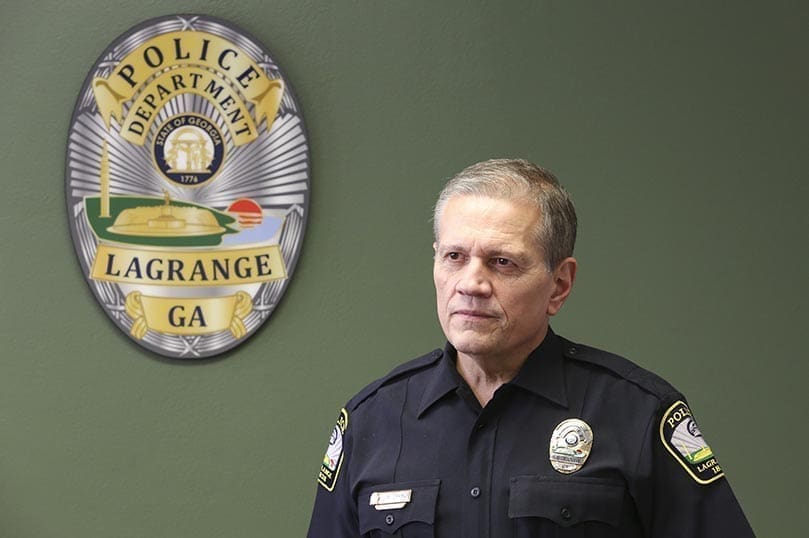 Photo By Michael Alexander
Photo By Michael AlexanderLaGrange
LaGrange assignment unforgettable experience for reporter
By ANDREW NELSON, Staff Writer | Published January 9, 2020
LAGRANGE—Is it ever too late to try to right a wrong? Do you apologize for something done generations ago?
That was the question faced by the police chief in LaGrange, Louis Dekmar. During his more than 20 years of service here, Dekmar had never heard of the brutal 1940 death of Austin Callaway.
But the history of the unanswered crime was passed from generation to generation for some African Americans in the community nearly 70 miles south of Atlanta.
The chief in 2017 publicly apologized for the 1940 lynching.
“As LaGrange police chief, I sincerely regret and denounce the role our police department played in Austin’s lynching, both through our action and our inaction,” Dekmar said to LaGrange community members. “For that, I’m profoundly sorry. It should never have happened.”
I hadn’t known Dekmar was Catholic until the Atlanta’s St. Thomas More Society legal community applauded his actions in the fall at its 2019 Red Mass celebration. The chief is a member of St. Peter Church, LaGrange.
His actions mirror those of the good Samaritan. Here was a wound in the community, unacknowledged by the wider community but felt by African Americans.
The chief took it upon himself to apply a balm. The Samaritan tending the wounded man “poured oil and wine over his wounds and bandaged them,” wrote St. Luke.
The lynching came to Dekmar’s attention after two elderly African American women looking at archival photos of city police officers were overheard to say the officers killed “our people.”
Dekmar knew he could not solve the cold case. He could not even find official records of the incident. That didn’t deter him. He finally learned what happened, reading national newspapers since Callaway’s murder wasn’t reported in the local paper.
The teenaged Callaway was picked up for “attacking a white woman” which Dekmar said is so broad a charge it could have meant anything from a physical attack to not averting his eyes from the woman in the Jim Crow era. Next, a mob kidnapped Callaway from the city jail, drove him out of town and lynched him.
Dekmar took me to the now-closed cells, which once housed Callaway. The rooms are in the basement of city hall, nothing more than a storage area now. I hoped to see the interior, but the doors were locked.
A marker acknowledging the 1940 crime is planted at Warren Temple United Methodist Church. In that church, where the Callaway family worshipped, a standing-room only crowd filled the aisles for the 2017 announcement by the chief.
Dekmar acknowledged the death of the young man, called it wrong and apologized on behalf of the police department.
The plaque, from the Equal Justice Initiative, recognizes the more than 4,000 racial lynchings in the United States between the Civil War and World War II.
“We can’t change history. But by addressing it, we interrupt history,” said Dekmar. “And we put a stop in history to show that, OK, that was then, this is now.”
The Georgia Bulletin news staff selected their favorite assignments of 2019 as part of Year in Review.